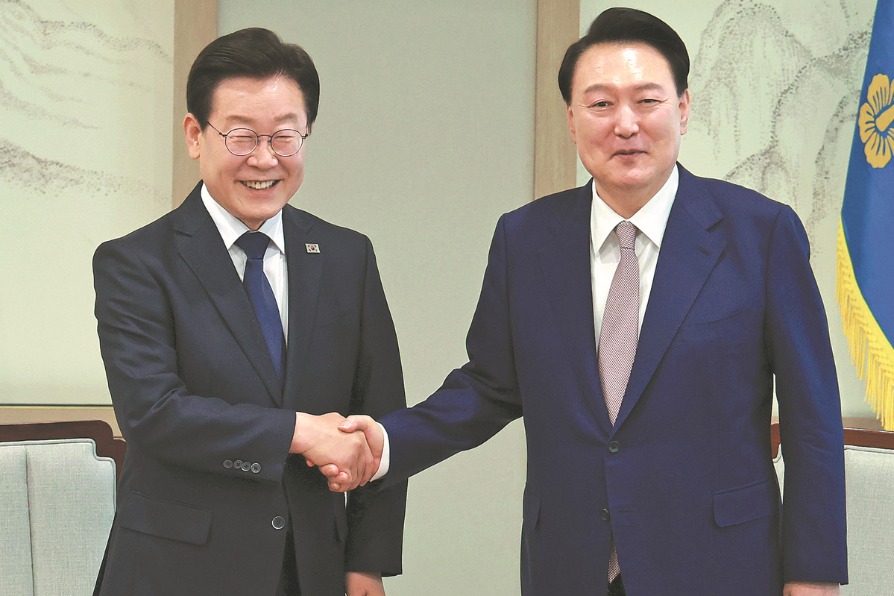US nuclear policy reflects hypocrisy, Cold War mindset
By Jiang Tianjiao | China Daily | Updated: 2021-08-21 09:29

US arms control experts, including former secretary of defense William Perry, recently wrote to Japanese Prime Minister Yoshihide Suga, asking him to support the "no first use of nuclear weapons" policy the Joe Biden administration is likely to propose. But despite the good intentions of people like Perry, it is difficult to change the stubborn conservative thinking and offensive nuclear strategy of most US politicians.
After the end of the Cold War, the US nuclear arms control policy has undergone periodic fluctuations, but on the whole, it is still dominated by conservative forces not averse to fighting a nuclear war. In the 1990s, with the collapse of the bipolar world order, the Bill Clinton administration tried to promote arms control, but the conservative forces, using the possibility of some countries possessing weapons of mass destructions as a pretext, helped build an overwhelming public opinion against it.
After the George W. Bush administration took office, the US not only withdrew from the Anti-Ballistic Missile Treaty but also put forward a highly offensive nuclear strategy, seeking to develop new nuclear weapons and use preemptive nuclear strikes against other countries, which frustrated the global disarmament movement.
True, after assuming office as president, Barack Obama proposed a "nuclear zero" initiative. But the hypocrisy of the initiative was exposed when the US refused to ratify the Comprehensive Test Ban Treaty, which prohibits "any nuclear weapon test explosion or any other nuclear explosion" anywhere in the world, and stuck to the "first use of nuclear weapons" policy. In fact, before leaving office, Obama approved a $348 billion nuclear arsenal modernization plan.
And Donald Trump, after being sworn in as US president, started a "nuclear overhaul". In its latest "Nuclear Posture Review Report", the US not only called for a comprehensive upgrading of the nuclear arsenal, but also said that in case it faces a "major non-nuclear strategic attack", it will actively respond with nuclear weapons.
Although the Democratic Party has always supported arms control, "first use of nuclear weapons" has become the politically correct strategic stance for the Biden administration for three key reasons.
First, the "first use of nuclear weapons" policy has become part of the strategic culture of the US. During the Cold War, the US prepared for a possible nuclear war with the Soviet Union and accordingly engaged in capacity-building. But even three decades after the end of the Cold War, the US is still preparing to fight and win a nuclear war. As such, it cannot give up the "first use" policy.
Second, the "first use of nuclear weapons" policy is the keystone of the US' deterrence strategy and the basis of its global alliance system. Since the beginning of the Cold War, the US has provided its global allies with a nuclear umbrella. If it abandons its "first use" policy, it can no longer provide the nuclear umbrella for its allies, which would increase the possibility of nuclear proliferation among its allies such as Japan and the Republic of Korea and could eventually lead to the collapse of the US alliance system.
Third, the "first use of nuclear weapons" policy is what gives the US asymmetric advantages in any strategic competition and conflict with another country. The US is also worried that rival countries could acquire asymmetric means, thanks to the rapid development of the new military technology, to launch sudden attacks against it.
That's why the US is keen on not only maintaining an absolute leading position in the field of emerging and advanced technologies, but also making full use of its existing military strength, including "first use of nuclear weapons", to counter new threats.
The "first use of nuclear weapons" policy has become part of Washington's DNA, and the US uses it to maintain its nuclear hegemony. The Biden administration may consider launching a peace offensive, but the US will never stop preparing to fight and win a nuclear war.
The author is an assistant director of the Center for BRICS Studies, Fudan Development Institute.
The views don't necessarily reflect those of China Daily.
























